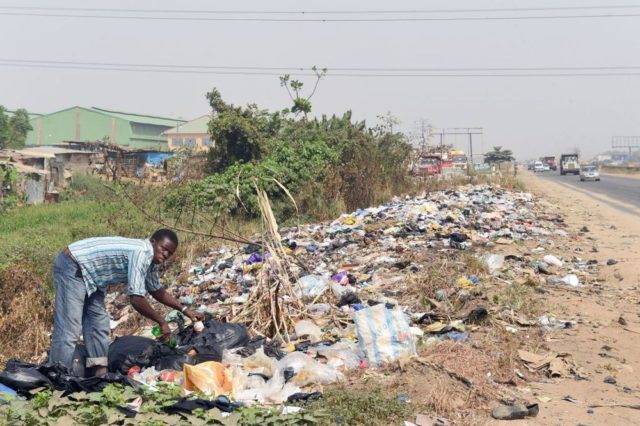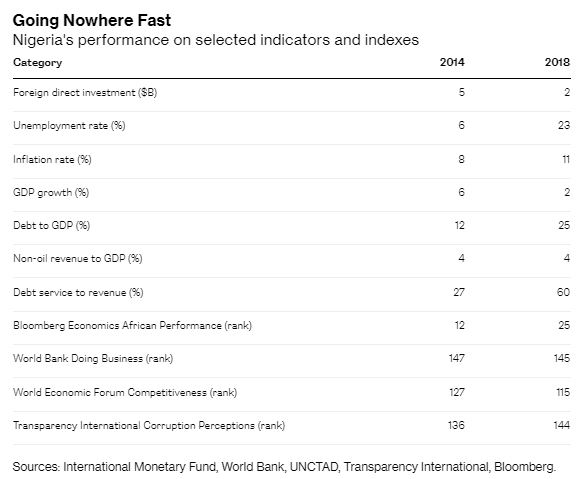
Nigeria is a much more important country than most people in the U.S. probably realize. With more than 190 million people, it’s Africa’s largest country by far (Ethiopia, the second-largest, has a little more than half as many). And with a fertility rate of about 5.5 children per woman, among the world’s highest, Nigeria is only going to grow in importance — by the century’s end, the country is projected to have almost 800 million people, almost twice as many as the U.S. by then.
But as things stand, this African giant is failing to create the prosperity that will sustain that future population. Its oil-dependent economy has struggled after oil prices plunged five years ago. The number of Nigerians in extreme poverty — generally defined as living on less than $1.90 a day — is estimatedto be increasing by six every second.
Meanwhile, the country’s economic institutions are failing, with rising unemployment and debt levels. A recent Bloomberg Opinion editorial laid out the grim numbers:
In the long run, Nigeria needs to wean itself from dependence on oil by spending energy revenues on education, health and infrastructure. But that plan might take decades to bear fruit in the best of circumstances. In the short run, Nigeria needs jobs.
One of the best way to create those jobs would be to increase international trade. And the quickest way to boost trade would be to join the African Continental Free Trade Area, the planned free trade zone of the African Union (an organization dedicated to forging closer cooperation between African states). The AfCFTA now includes 52 countries and more than $2 trillion of economic activity. Entering that agreement, which would eliminate tariffs on 90% of goods, would open up plenty of new markets for Nigerian-made products.
But Nigeria’s manufacturers see the AfCFTA as more of a threat than an opportunity. Frank Jacobs, president of the Manufacturing Association of Nigeria, recently declared that “When they open our borders for all manner of products to come into this country, most of our industries will be out of business.” The Nigeria Labor Congress, an umbrella organization of trade unions, called the AfCFTA an “extremely dangerous and radioactive neo-liberal policy initiative.” As a result of this political opposition, Nigeria has balked at joining the agreement.
There is some justification for reluctance. Though the current accord is mainly about reducing tariffs between African member states, the AU plans to follow it up with a push for a customs union and a single currency. This latter step would be a bad idea. As Europe discovered so disastrously in the financial crisis, a currency union can exacerbate local recessions, since it makes it impossible for countries with weak economies to depreciate their currencies and become more competitive. A monetary union without fiscal integration makes sovereign-debt crises like the one in Greece much more likely and damaging. Africa should avoid making the same mistakes that Europe made. And Nigeria, especially, should be wary of a currency union — its natural resource exports tend to push up the value of its currency, the naira, making non-oil exports less competitive, meaning the country needs to push its currency down in order to restore balance.
But signing on to the AfCFTA wouldn’t oblige Nigeria to adopt the later stages of the AU plan. For now, the priority should be opening the country to trade. Nigeria now is highly protectionist. Its list of prohibited or restricted imports is long, including items such as carpets, shoes, handbags and most types of furniture. The government also makes a large number of imports, such as textiles and clothing, ineligible for foreign exchange at the central bank’s official window, making it harder to import these items.
In her book “The Next Factory of the World: How Chinese Investment Is Reshaping Africa,” McKinsey & Co. researcher Irene Yuan Sun argues that these import restrictions have damaged Nigeria’s manufacturing sector. The obstacles to importing textiles have made it difficult for Nigeria to develop a competitive clothing-export industry of the type now growing in Ethiopia. And the impediments to importing labor-intensive manufactured goods like furniture, shoes and carpets, though it has shielded Nigeria’s manufacturers in the short term, has had the long-term effect of preventing them from learning how to compete in international markets.
This is a drag on growth. Labor-intensive manufacturing is still almost certainly the best and quickest path for nations to escape mass poverty. Journalist Joe Studwell argues in “How Asia Works” that exporting raises productivity and encourages the import and adoption of advanced foreign technology. And Harvard University economist Dani Rodrik argues that promoting exports helps countries to discover what they’re good at doing, allowing them to invest with confidence and to establish a stable niche in the global economy.
Maintaining an insular, protectionist stance is often tempting for a country as large as Nigeria, whose manufacturers are always clamoring for the prize of a captive domestic market. But this approach merely provides a crutch that ultimately preserves industrial weakness. Instead of hiding behind trade barriers, Nigeria should focus on aggressively promoting manufactured exports. Gaining access to nearby African markets would be one step toward doing that. Courting foreign-direct investment, depreciating the currency and pushing companies to export are other important steps. And in the long run, investments in education, health and infrastructure will make Nigeria an attractive platform for labor-intensive manufacturing. This is the giant African country’s best hope for escaping a looming tsunami of poverty.
Source: Bloomberg.com









If only the government would take heed, sadly the country is battling corruption, hence our economy becoming worse.